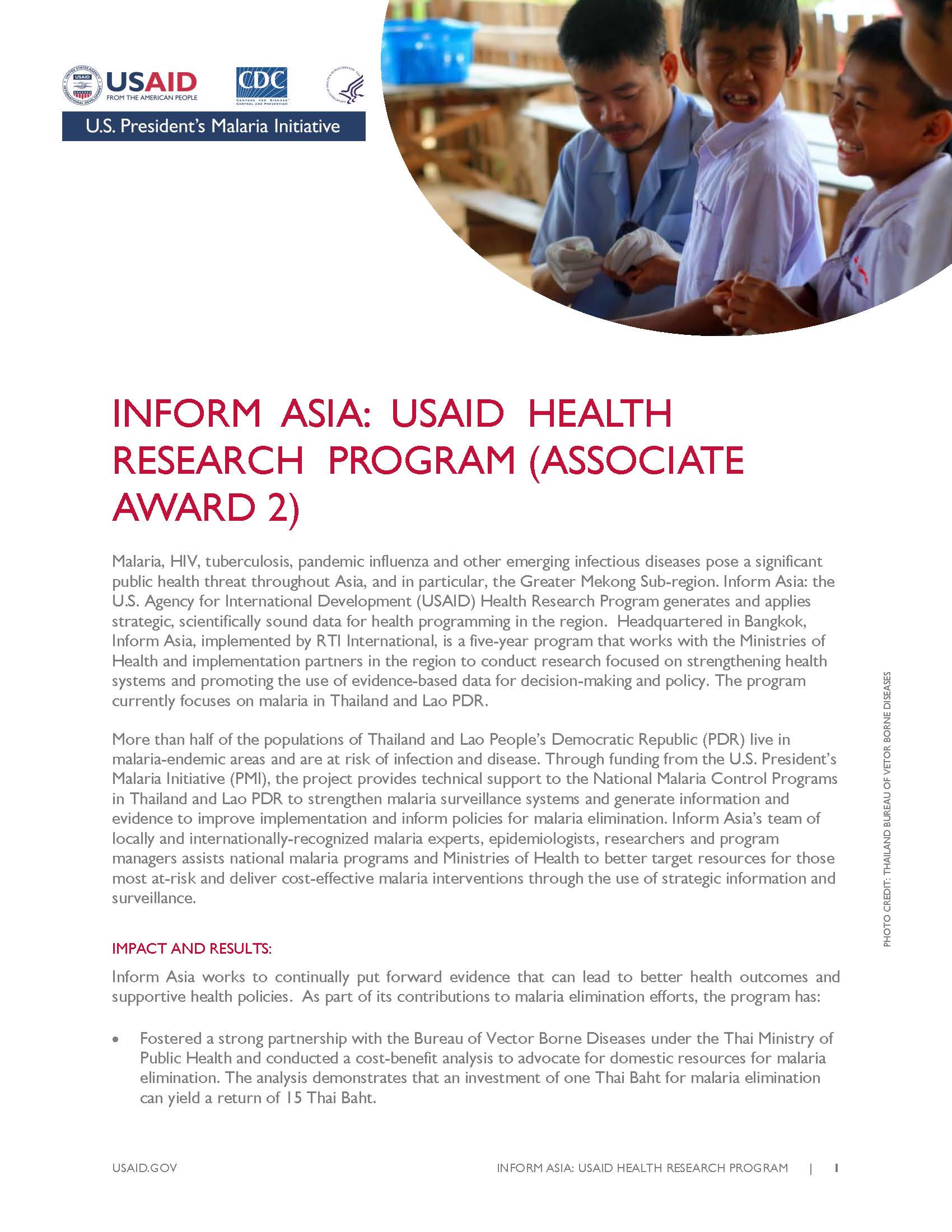Speeches Shim
Malaria, HIV, tuberculosis, pandemic influenza, and other emerging infectious diseases pose a significant public health threat throughout Asia, and particularly, the Greater Mekong Subregion. Inform Asia: the U.S. Agency for International Development (USAID) Health Research Program generates and applies strategic, scientifically sound data for health programming in the region.
Implemented by RTI International, Inform Asia is a five-year program that works with ministries of health and implementation partners in the region to conduct research focused on strengthening health systems and promoting the use of evidence-based data for decision-making and policy development. Headquartered in Bangkok, the program currently focuses on malaria in Thailand and Lao People’s Democratic Republic (PDR).
Thailand and Lao PDR have achieved significant progress towards malaria elimination, with most remaining malaria transmission foci concentrated in border provinces. Aligned with the World Health Organization’s (WHO’s) Strategy for Malaria Elimination in the Greater Mekong Subregion: 2015-2030, Thailand and Lao PDR have laid out a common vision to achieve malaria-free status by 2024 and 2030, respectively. Through funding from the U.S. President’s Malaria Initiative (PMI), Inform Asia provides technical support to the national malaria programs in Thailand and Lao PDR to strengthen malaria surveillance systems and to generate information and evidence that will improve implementation and inform policies for malaria elimination.
Inform Asia’s team of locally and internationally-recognized malaria experts, epidemiologists, researchers and program managers assists the national malaria programs and ministries of health of Thailand and Lao PDR to better target resources for those most at-risk and deliver cost-effective malaria interventions through the use of strategic information and surveillance.
IMPACT AND RESULTS:
Inform Asia continually advances evidence that can lead to supportive health policies and better health outcomes. As part of its contributions to malaria elimination efforts, the program has:
- Fostered a strong partnership with the Bureau of Vector Borne Diseases under the Thai Ministry of Public Health and conducted a cost-benefit analysis to advocate for increased domestic resources for malaria elimination. The analysis demonstrates that an investment of one Thai Baht for malaria elimination can yield a return of up to 15 Thai Baht.
- Provided technical assistance to integrate case-based malaria information into a single national database (Malaria Online) in Thailand and to deploy web-based tools and analytics for more cost-efficient planning and decision-making;
- Improved substantially the user interface of Thailand’s malaria information system through easy-to-use dashboards that include automated malaria foci classification and mapping, enabling health officials to notify malaria patients within one day, track case investigations within three days, and employ a response within seven days (known as the 1-3-7 approach);
- Supported quality assurance and documentation of WHO-implemented therapeutic efficacy studies in Thailand, including support for an integrated drug efficacy surveillance module that will serve as a model for other malaria-eliminating countries to monitor drug resistance; and
- Partnered with the Center for Malaria, Parasitology and Entomology under the Ministry of Health in Lao PDR to enhance their technical leadership and programmatic capacity with a focus on implementation of the 1-3-7 approach.
PARTNERS
Inform Asia is implemented by RTI International. The program collaborates with the Bureau of Vector Borne Diseases and Bureau of Epidemiology, Ministry of Public Health, Thailand; the Center for Malariology, Parasitology and Entomology, Ministry of Health, Lao PDR; and the WHO Global Malaria Program, and WHO Country Offices, Thailand and Lao PDR.


Comment
Make a general inquiry or suggest an improvement.